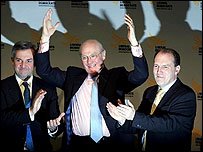Friday, March 31, 2006
Groundhog Day again?
I have a feeling that all that will happen is that Sinn Féin will complain the basics of the Good Friday Agreement are being breached, the DUP will continue to huff, puff and "refuse to have anything to do with terrorists" (not that the DUP have ever been consistent on that), Alliance will continue to whine about any arrangement that requires a "majority in both communities" and not much progress will be reached. And so the same cycle played out throughout the last decade will be repeated once more.
Sometimes I look at Northern Ireland in despair, wondering if any form of devolved government could ever work. Is Direct Rule going to be forever? Or is it time to consider completely integrating Northern Ireland into the United Kingdom and have rule from Westminster, perhaps with a UK wide political system? Could that be the only way forward?
Wednesday, March 29, 2006
And so it's Cable
The results were as follows:
Round 1
Vincent Cable 21
David Heath 17
Matthew Taylor 25
No preference 0
Heath was eliminated and his votes redistributed to their next available preference.
 Round 2
Round 2Vincent Cable 31
Matthew Taylor 29
Non-transfers 3
And so Vincent Cable becomes the next deputy leader of the Liberal Democrats and his role in the downfall of Charles Kennedy appears to have been forgiven. But I doubt he will be the next leader of the party - so that speculation will no doubt continue.
 Oh and if anyone thinks that I've been in any way harsh about Lembit Öpik and his repeated habit of supporting campaigns that get nowhere then you might want to take a look at other blog posts like The Curse of Opik, The curse of Lembit, Curse of the Were-Lembit, Öpik - The Dead Horse Flogger, The Curse of Opik, The Curse of Lembit - Part II, The curse of Lembit Part Two, and The Curse of Lembit: Part III to name but a few. It's not looking good at all for Lembit is it?
Oh and if anyone thinks that I've been in any way harsh about Lembit Öpik and his repeated habit of supporting campaigns that get nowhere then you might want to take a look at other blog posts like The Curse of Opik, The curse of Lembit, Curse of the Were-Lembit, Öpik - The Dead Horse Flogger, The Curse of Opik, The Curse of Lembit - Part II, The curse of Lembit Part Two, and The Curse of Lembit: Part III to name but a few. It's not looking good at all for Lembit is it?
Who should be the next US President?
 Personally I'd like to see Rudy Giuliani run. He's on the bearable wing of the Republicans, has shown great leadership in turning New York City around and holding it together on 9/11 and could do much to restore the reputation of the US across the world. Already so-called "pro lifers" (sic) are declaring their opposition to a Giuliani candidature which is a good sign that he has the right enemies. Draft Rudy Giuliani has launched the campaign for him to be President.
Personally I'd like to see Rudy Giuliani run. He's on the bearable wing of the Republicans, has shown great leadership in turning New York City around and holding it together on 9/11 and could do much to restore the reputation of the US across the world. Already so-called "pro lifers" (sic) are declaring their opposition to a Giuliani candidature which is a good sign that he has the right enemies. Draft Rudy Giuliani has launched the campaign for him to be President. Sadly my preferred Vice-Presidential candidate is unlikely to be available at the moment due to the current provisions in the US Constitution baring people not born in the US from running. Otherwise Arnold Schwarzenegger would make an interesting choice. I am sure many would agree with his principles of balancing budgets, removing incompetent public officials from office and delaying the making of any more Terminator movies!
Sadly my preferred Vice-Presidential candidate is unlikely to be available at the moment due to the current provisions in the US Constitution baring people not born in the US from running. Otherwise Arnold Schwarzenegger would make an interesting choice. I am sure many would agree with his principles of balancing budgets, removing incompetent public officials from office and delaying the making of any more Terminator movies!
Laura Blomeley's memorial service
What's been amazing is the sheer volume of tributes that have been made to her. Individual ones can be found on the blogs of her fellow sabbatical Martin Donkin, student Kate Price and many other sites. A huge volume can be found on the special tribute page on the QMSU website.
Whatever Happened To The Last Human?
 This week saw the release of Red Dwarf VIII, to date the final season of the program. And arguably the worse.
This week saw the release of Red Dwarf VIII, to date the final season of the program. And arguably the worse.One of the basic premises of Red Dwarf is that the characters are a small cast, alone aboard their spaceship, isolated in the universe and facing all manner of bizarre situations. Much of the humour extends from the characters' interactions with one another and the bizarre situations they encounter. Red Dwarf VIII goes far from that, becoming a more generic space series.
Some argue that the series "jumped the shark" during Red Dwarf VII when writer Rob Grant and actor Chris Barrie (Rimmer) left, the series shifted to single camera filming and abandoned the studio audience and the tone shifted from a science-fiction sitcom to comedy science-fiction. But that season stayed true to the basics and produced some of the best episodes. Unfortunately it was not well received in certain quarters and Red Dwarf VIII represents a disastrous attempt to reverse some of the changes (bringing back the studio audience and aiming for more situation comedy) and introduce new changes (resurrect lots of human characters, shift the setting to a space prison and remove the characters' chances to be slobby, coolly dressed, enforcing pedantic regulations, delighting in cleaning or acting like an ice queen) that renders the series very different from what it was before. Whatever Happened To The Last Human?
That's not to say the season is all bad in itself. But in the overall scheme, this is the weakest of the Red Dwarf seasons and is a bad ending for the show. Earlier seasons had shown that the series could make significant changes and stay true to itself, always moving forwards, and so a further season, restoring a lot of the original scenario (which is highly workable - the end of season 8 could be used to write the other characters out) and taking the series forward could still be possible. Even if it was written as the last season from the outset (it appears no-one expected Red Dwarf VIII to be the last at the time of production) it could still be something glorious.
But will it happen? It's been seven years now...
Monday, March 27, 2006
Is Blair trying to wriggle out of leaving?
Is Blair trying to claw his way out of his promise? It wouldn't be the first time he'd go back on his word and were he to get a fourth term (Heaven help us!) he could retire after the London Olympic Games (and Old Man Brown would be even less likely to succeed) and possibly have the climax to his premiership that his current output has so spectacularly failed to provide. Statements like this can only focus attention on the promise and perhaps make it easier to generate some kind of public support for a retraction.
And if he does seek a fourth term, it's essential that a good alternative is presented to the UK electorate. The country desperately needs change for the better.
Sunday, March 26, 2006
The Oyster Card is a mess
The smarter, faster, easier way to travel around London.Except it's frequently not at all smart, faster or easy and for some the Oyster is a minefield to comprehend.
A lot of the problems stem from National Rail not supporting Oyster, but it doesn't help when National Rail and TfL seem to constantly blame each other for this state of affairs. Furthermore TfL has run a very confused advertising campaign and given appalling training to frontline staff that make it very hard for passengers to understand some of the nuances.
The "General Information" on the TfL website is full of confusions so let's look at some of the more bizarre ones:
How do I use Oyster?I am still waiting for someone to show me where the card reader is at Forest Gate railway station! What am I supposed to touch the card on at the beginning and ending of my journeys there?!
Tube and National Rail stations
Always touch it on a card reader at the beginning and end of your journey, even if the gates are open.
DLRBut if one is using the PrePay extension facility on the travelcard (more on this below) one isn't actually using pay as you go when touching in, just out.
You only need to touch in and touch out when using Oyster to pay as you go.
Which tickets are available on Oyster?Except that you can't put a one day travelcard on the Oystercard. And the "combination of both" requires the user to do things contrary to the advertising.
You can put your Travelcard or Bus Pass season ticket on it, add travel value (cash) to pay as you go, or have a combination of both.
What is daily price capping?We now reach the big problem. The price capping scheme is sold as a way to prevent the traveller buying more than they actually need, and to allow them to travel wherever they like without having to plan in advance. But without National Rail the scheme does require travellers to plan in advance and sometimes pay more than they actually need.
This is the most you'll pay a day when using Oyster to pay as you go on Tube, DLR, bus, tram and some National Rail services (PDF 856KB) in Zones 1-6. You are charged the appropriate Oyster fare for each single journey you make. If you make several journeys on the same day, once the total cost of these journeys reaches a cap, any further journeys you make that day will be free, unless you travel beyond the zone(s) covered by your original cap.
The capping rates are dependent on when you travel, the zones you travel in, the transport modes you use and any season ticket you have on your Oyster card. If you intend to use National Rail services, a Day Travelcard may suit you better.
Lowest fare promiseBut there is no such "equivalent Day Travelcard price" - what you get if you pay 50p more is a Day Travelcard covering National Rail as well. 50p is a pathetic discount, especially as many of the individual tube fares have had the non Oyster fares increased by £2.00 to encourage people onto Oyster.
During any 24-hour period from 0430 to 0430 the following day, you will never pay more than 50p less than the equivalent Day Travelcard price for all your Oyster single journeys in Zones 1-6 or we will refund the difference.
And there's very little about the extension service for travelcard users. The idea is that if someone has a travelcard loaded onto Oyster (a season ticket only; TfL doesn't seem able to grasp that a one day travelcard could just as easily work on this) and wishes to travel beyond the zones covered by this, then the barriers at the end/return start of their journey will deduct the fare from the zone boundary where their season ticket validity ends. It's a good idea in theory, but one of the annoying pieces of small print is that it requires the travelcard holder to touch in at the start/end of their journey as well - and many do not, especially those starting from National Rail stations where there are no barriers to touch in and out at. The posters at these stations making it clear that "PrePay is not available from this station" reinforce the concept in the traveller's mind that they are not PrePay users until they reach the relevant zone boundary, and so they do not touch in on the "PrePay Users only" readers on some tube platforms. There are also some National Rail services that accept Oyster for historic reasons, such as Liverpool Street to Stratford. Someone with a Zones 2-6 travelcard on Oyster could in theory travel from a railway station like Forest Gate to Liverpool Street and back and seek to get an extension for the Zone 1 part of the journey, only to get fined because they haven't touched in/out at Forest Gate, where there are no readers for them to do so!
There is so much that confuses and conficts on Oyster that it does not surprise me that so many cannot understand it. Newsgroups and discussion boards are full of people trying to comprehend the more subtle features and work out what to do to avoid getting unnecessary fines. Why didn't TfL use its muscle to either force National Rail to support the system in full (which would solve a good half of the problems), rather than create a mess and then so badly advertise it they got taken to the cleaners by the Advertising Standards Authority?
Saturday, March 25, 2006
Can it get any worse for Labour?
Out of over a thousand votes just six were cast for the Labour candidate.
Has Labour ever polled so low before?
Even more silly is the Waverley Labour Rose Newsletter:
Surge in Labour vote defeats Tories in By-Election.Leaving aside their use of a nineteenth century party name (although once again it shows that Not So Very New Labour aren't even Yesterday's Men), their comments are absurd - the majority was 12 and since Labour didn't put up a candidate last time it was mathematically impossible to lose votes. Even Labour spin is failing.
The Tories lost a Council Seat in Ewhurst thanks to a surge in support for Labour. Both the Tories and the Liberals saw their vote share plummet by 16% and 23% while Labour's vote increased. Jubilant Labour candidate Ivor Hopeful said " Clearly voters are rejecting the Tories and Lib Dems in droves while our support remains solid. I am delighted to have contributed to this defeat of the Tories".
If Old Man Brown ever does get to be Labour Leader (if Blair ever realises everyone wants him to go) will there be any Labour support left for him to hold onto?
An inability to get the figures right or just whatever will benefit?
First, from this BBC News story, Öpik stated at the time of Charles Kennedy's fall:
They've got what they wanted and we lose the most successful party leader we've had for 83 years...And yet the Lib Dems only had 62 MPs at that point, when there were 72 Liberal MPs elected in 1931.
Now traditionally the excuse is made that in 1931 the Liberals were split in three and that only those following Sir Herbert Samuel were the "official Liberals". Any other MPs with "Liberal" in their description would be ignored, including Clement Davies, then MP for what is now Öpik's seat. But a scan of the Montgomeryshire Liberal Democrats website shows that this line of reasoning is not followed by Öpik and his local party when they triumphantly proclaim:
The area has been represented by a Liberal/Liberal Democrat MP for over a hundred years except for a four-year period (1979-83).So Davies was considered a Liberal throughout his political career. Therefore the National Liberals could be counted as Liberals, and presumably also the four members of Lloyd George's family who decided to sit the National Government out completely from this point, meaning that in 1931 there were more than 62 Liberal MPs elected - 72 in total (and proportionally even more in a smaller House of Commons). And 1931 was only 75 years ago, not 83!
...
Clement Davies (1929-1962)
So are the Lib Dems unable to count or are they selective about which parts of their history they will and will not acknowledge? Or will they just say whatever will benefit them at the time?
No longer the lingua franca but the langua angla
No longer does the world converse in the lingua franca but instead it now uses the langua angla. Maybe it's time to rewrite the famous scene in Yes Prime Minister:
Jim: Don't we ever get our way with the French?
Sir Humphrey: Well, sometimes.
Jim: When was the last time?
Sir Humphrey: Battle of Waterloo 1815.
Thursday, March 23, 2006
School uniforms
At the most basic level this seems like another case of the courts once more upholding the necessary powers of schools in difficult matters. But it is hard not to notice the wider problems this case has brought up.
Schools are traditionally not bastions of democracy, liberty and individualism. Orders are passed down from upon high, the pupils have little say in where they are and what they do (and there are punishments called "detention" - I wonder how long it will be before someone tries to get a writ of habeus corpus!) and dissent is looked down upon in favour of uniformity. School uniforms are one of the most visible means by which all pupils can be put on the same level, undermining superiority complexes and helping to break down social and cultural barriers between pupils. But for it to be able to do this schools need control over their uniform policies. From this perspective the outcome of the case should be clearly in favour of the school.
But then we are faced with the question of the right of people to wear religious dress. The Law Lords however covered this in their ruling:
Article Nine [of the Human Rights Convention] does not require that one should be allowed to manifest one's religion at any time and place of one's own choosing. Common civility also has a place in the religious life." Lord Hoffmann said.The pupil in question, Shabina Begun, had been at the school for two years and had not expressed dissent from the school's uniform policy:
Lady Hale pointed out that the school had respected cultural and religious diversity by allowing girls to wear a skirt, trousers, or the shalwar kameez, with or without a headscarf. This was a "thoughtful and proportionate response", as shown by the fact that girls were worried that they would come under pressure to wear the jilbab if it had been permitted.Described variously as a triumph of common sense by Miriam's ideas or more bluntly Shabina Begum gets told off by the Lords by Narcissistic views on News/Politics, the case has won support from bloggers across the globe. GayandRight has even asked Could you imagine a ruling like this in Canada??? It's hard at a glance to see any bloggers supporting Shabina's appeal on an initial search.
Any school uniform policy needs to strike a balance. It needs to be acceptable to most pupils and supported by their families, achieve the purposes and not prove a source of disruption. The school in question had gone to great lengths to have a policy that commanded support across the Muslim community and which is accepted by the vast majority of pupils - indeed as pointed out some find the policy to be protective. In such circumstances, what as the school to do? As Muslim WakeUp! puts it:
Shabina’s school did not prevent her from wearing a headscarf. Unlike French schools which have banned the hijab outright, Shabina’s school went out of its way to accommodate the needs of students who are nearly 80 percent Muslim, speak 40 different languages and who are from 21 different ethnic groups.To non-Muslims the details of the debate within Islam about what clothing is required can be difficult to fathom. The school clearly did everything reasonable to seek a broad consensus which did not meet an outcry until two years after Shabina had started at the school. It would have been unworkable to rip up the carefully researched and agreed existing uniform policy for the sake of a single pupil. Philosophically the case raises the difficult question of how far tolerance can run. Schools do not have the luxury of an ideal philosophical situation. They have to operate effectively.
Students could wear the regular uniform or they could wear a shalwar kameez, which consists of loose-fitting trousers and a long tunic. They could wear a headscarf as long as it conformed to certain criteria. In order to satisfy the needs of the diverse background of its students, the school consulted with pupils, parents, schools and leading Muslim organizations when it was formulating its uniform policy.
And yet this was not enough for Shabina who wore the shalwar kameez from the time she enrolled at the school when she was 12 until September 2002 when she suddenly decided to wear the jilbab, a long loose fitting one-piece item that covers the body from head to ankles.
Her school refused to allow her to attend until she resumed wearing the approved uniform. Shabina took the school to court but her case was rejected by High Court judges last summer. The school had argued that allowing her to wear a jilbab would impact on the rights of other Muslim girl pupils who opposed allowing the jilbab as they felt that it would create a hierarchy of belief at the school.
Her school was right. What has become of our faith that it has turned into a competition over who can cover the most? Who convinces young Muslim women that they must cover more and more, going far beyond what is deemed the modest clothing that Islam requires of men and women?
As for Shabina, she has now switched schools and so is able to receive her education. And is this the last we have heard of her? Seb's Blag doesn't think so:
So, Shabina lost her case, but what will history's verdict be? Is she a Muslim extremist, when all's said and done, at least in terms of her beliefs? I don't think so. Misled, possibly; naive, probably; young, definitely. Most importantly though, I'd say she's a Brit with true grit. And I won't be surprised if we see a lot more of her in future.But will we see more furore over uniform in schools? Only time will tell. But I hope that this country reaches a solution that is far more workable and tolerant than France's ideological ban on the hijab.
Wednesday, March 22, 2006
Labour - a party for all the country?
Why on earth is this article called 'Labour Party (UK)'? My complaint is that the Labour Party is not a United Kingdom party, but rather a British party, which has always kept itself out of Ireland. I would advocate a move to Labour Party (Great Britain).For a long time Labour's refusal to allow residents of Northern Ireland to join the party was one of their most absurd features, especially when residents in every other part of the world could. Even now the decision by the central committee of the party to bar local organisation and campaigning flies in the face of claims to be "a party for the entire country". (It also makes a complete mockery of the Labour website URL http://www.labour.org.uk)
Furthermore it does little to help the "normalisation" of the politics of the province that Tony Blair and Peter Hain often speak of. Attempts by the Conservatives to establish themselves in the province haven't been the most successful, in part due to the absence of a left option to make right-left politics a possibility, but the central party has not shut down the Northern Ireland branch. The Liberal Democrats allow an organisation that has decided to not stand in favour of the Alliance. Why doesn't Labour trust its members in Northern Ireland to organise and take a decision for themselves on whether or not to stand?
As for the Wikipedia page location, my own comments are:
Whilst I personally agree that Labour is not a party for the entire country (and the URL labour.org.uk is misleading), ultimately Labour is a party that seeks (and sometimes obtains) power to govern the United Kingdom in its own right. Several other parties across the world similarly do not organise across the entire country, but relabelling them would get more confusing.
Oh and Labour hasn't always kept out of Ireland - one of the earliest conferences in the 1900s was held in Belfast.
Tuesday, March 21, 2006
Not another two years!
Once upon a time, when Blair was the future (it was that long ago), he was seen as a politician who was thought to be able to give the nation what it needs. He has failed. He has one last chance to give the nation what it wants - and that is to resign now.
Sunday, March 19, 2006
Yet another (deputy) leadership election
But on reflection Harman is being stripped of key ministerial responsibilities, prone to making silly gaffes, has hit the headlines for her driving activities, can generate fierce political storms and is considered by some to be ignorant.
Would she really be such an unthinkable choice to step into John Prescott's shoes?
The moral politics test
 So what does this test say about me:
So what does this test say about me:Your Score
Your scored 1.5 on the Moral Order axis and -1.5 on the Moral Rules axis.
Matches
The following items best match your score:
System: Conservatism
Variation: Moderate Conservatism
Ideologies: Capital Republicanism
US Parties: Republican Party
Presidents: Gerald Ford (90.62%)
2004 Election Candidates: John Kerry (79.99%), George W. Bush (78.12%), Ralph Nader (65.06%)
Statistics
Of the 169569 people who took the test:
0.7% had the same score as you.
46.3% were above you on the chart.
46.6% were below you on the chart.
22.5% were to your right on the chart.
71.8% were to your left on the chart.
Take the test at Moral Politics.
So just what do Deputy Leaders actually do?
One has to wonder why Prescott was out of the loop on such a crucial issue. Just what purpose does the Deputy Leader of a political party serve?
Could it be David Heath after all?
A great performer in the Commons, seemingly well liked by his colleagues and with an unusually good handle on massively important and largely ignored issues, like the tortured death of legal aid in Britain.Meanwhile The Apollo Project notes that the odds on Heath are good, for those who've got in the habit of casting political bets. So could this not widely known man become the Liberal Democrats' Number 2? Or will Lembit Öpik endorse him?
Saturday, March 18, 2006
Howard's Way out
Guy Fawkes has a good tribute to Howard and there will be others.
I remember the week Howard became leader quite well. The party had been wandering aimlessly, with Iain Duncan Smith being increasingly embattled and no-one could see a way forward. Then IDS fell and many worried that yet another leadership election would just lead to more wrangling and uncertainty.
Instead Howard rapidly established his claims as the candidate who could unite the party and take it forward. After years of despair the Conservative Party finally went on the front foot, taking the fight to Not So Very New Labour. It speaks volumes that Labour were forced to resort to their worn out tactic of getting the party name wrong and claiming the leader was an extreme right winger, rather than offering coherent counter arguments.
Howard did not win the last general election, it is ture, but he made the first advance in seat terms since the mid 1980s. And his final months at leader saw a brilliant strategy of seeing off attempts to force an immediate leadership election and giving the party time to reflect and discuss the way forward. The main legacy of Howard's leadership is the rise of David Cameron. It is a pity will not be in the Commons to watch Cameron from the government backbenches.
But he has made a few mistakes. Why on earth does he support Liverpool?!
So who will succeed Ming?
 Naturally the Deputy Leadership race is attracting a bit of speculation as to how it will influence the eventual leadership succession, though it has to be said that none of the three candidates look like natural choices. Ming's Dynasty: The Battle For The Succession is predicting that Vincent Cable will be "Imperial Regent". But I think he's got the terms mixed up - shouldn't it be Klytus?
Naturally the Deputy Leadership race is attracting a bit of speculation as to how it will influence the eventual leadership succession, though it has to be said that none of the three candidates look like natural choices. Ming's Dynasty: The Battle For The Succession is predicting that Vincent Cable will be "Imperial Regent". But I think he's got the terms mixed up - shouldn't it be Klytus?
Pressed out?
For the uninitiated the "circulation" for a newspaper is the number of copies sold each day, whilst the "readership" is the number of people actually reading the paper. The National Readership Survey calculates the latter on the basis of a mass survey and is the basis used for selling advertising space so there is a strong vote of confidence in it as an accurate measure from one of the most important quarters. (The NRS website refers to "Great Britain" - I am not sure if it covers Northern Ireland. However that distinction is currently rather more relevant to advertisers than political influences.)
The readership figures for the daily and Sunday papers are as follows (percentage comparisons are with last year):
Dailies:Several points immediately stand out. First off is the decline of the Mirror. There was a time when was talking tough about readership being on the up and aiming to challenge The Sun for the top slot. Instead it has declined drastically and is now lagging well behind the Daily Mail.
The Sun = 8,140,000 (-8%)
Daily Mail = 5,640,000 (-2%)
Mirror = 4,150,000 (-11%)
Daily Telegraph = 2,160,000 (-1%)
Daily Express = 1,980,000 (-7%)
The Times = 1,810,000 (+9%)
Daily Star = 1,780,000 (-9%)
The Guardian = 1,220,000 (+14%)
The Independent = 705,000 (+10%)
Financial Times = 391,000 (-10%)
Sundays:
News of the World = 8,630,000 (-9%)
Mail on Sunday = 6,310,000 (=)
Sunday Mirror = 4,570,000 (-6%)
Sunday Times = 3,550,000 (+9%)
Sunday Express = 2,230,000 (+1%)
Sunday Telegraph = 2,040,000 (=)
People = 1,980,000 (-11%)
Observer = 1,290,000 (+11%)
Star = 1,020,000 (-16%)
Independent on Sunday = 788,000 (+18%)
The Daily Express should frankly be ashamed of itself and I wouldn't be surprised if Lord Beaverbrook is turning in his grave. When doing research for my thesis I have seen many copies of the Express from the late 1930s when it routinely trumpeted its latest increases in sales, at one stage breaking the world record for sales almost every month. Now it is lagging far behind those glory days.
The Independent, Times and Guardian have all substantially increased their sales - is this a continued effect of the "compact" format? And if so, can the Telegraph hold out? (And what will happen to all the readers who despise the compact format?)
(On the issue of the compact format, I have to wonder if it isn't driven more by newsprint costs rather than the often cited problem that commuters find it difficult to fold the paper on the train. When I commuted to school nearly three-quarters of the carriage read a broadsheet each day and it wasn't hard to master the trick of folding the page in half to slide round.)
But it's the message about party support and influence that stands out the most from these figures. ALGALW's analysis has it best:
...while it's debatable whether newspapers' endorsements of political parties in reality has much effect... it’s interesting to tot up the numbers.I'm not sure many newspaper readers vote on the basis of editorial endorsements and newspaper circulation drives generally focus on matters other than their political stance. But the media can still write up or write down individuals and parties. Over the next three or four years several of these papers can have a big impact. Constant headlines and major stories about achievements of one party and/or the failures of another do have an impact on shifting public opinion. As has been shown by the Tessa Jowell affair the media often plays a strong role in sustaining a story and keeping it in the public eye.
The Labour Party was supported by five daily newspapers at the 2005 general election (Sun, Mirror, Times, Guardian and FT), with a combined readership of 15,711,000 (56% of total readership). The Tories could count on just three (Mail, Telegraph and Express), with readerships of 9,780,000 (35%).
Rather quirkily, the Star and Independent have this much in common: both declined to endorse any one party (one out of utter disinterest, the other out of split loyalties). The Sundays, far less influential, were slightly more even (51% to 44%), owing to the Sunday Times's tepid support for the Tories.
But these figures illustrate how important is Rupert Murdoch – whose 75th birthday it was last week-end – to Gordon Brown and David Cameron. (I suspect Ming Campbell has probably written off the chances of gaining this senior citizen’s vote.) The 56:35 split in daily newspaper readership figures in favour of Labour could easily be reversed if Mr Murdoch were to decide the Sun (and Times) should switch sides next time, and back the Tories.
But the other big point is the general decline in readership. Daily sales have dropped from thirteen to twelve million in the last three years. At the same time digital television has expanded, online newssites are getting even better and larges parts of the public are receiving their news from ever more diverse sources. One has to wonder whether Murdoch really does have the power so many have long attributed to him.
Friday, March 17, 2006
So who is David Heath?
 Liberal England is backing David Heath, but frankly he has the lowest profile of any of the three candidates. He has only been in the front line of Liberal Democrat spokespersons for a year, but wasn't one of the MPs who publicly forced Charles Kennedy to stand down (of the contenders, only Vincent Cable was), so one wonders whether he would be able to take a stand against incompetence. Perhaps there's more on his website but at the moment one has to wonder why he is considered the best in the field.
Liberal England is backing David Heath, but frankly he has the lowest profile of any of the three candidates. He has only been in the front line of Liberal Democrat spokespersons for a year, but wasn't one of the MPs who publicly forced Charles Kennedy to stand down (of the contenders, only Vincent Cable was), so one wonders whether he would be able to take a stand against incompetence. Perhaps there's more on his website but at the moment one has to wonder why he is considered the best in the field.Oh and already someone has made the following observation:
But if he wins I suppose we had better be ready for beard & sandals jokes.On a more serious point, can someone explain just what the existance of a formally elected post of Deputy Leader of a political party actually achieves? Other than designating someone to mind the shop if the leader gets run over by a bus (or stabbed in the front by colleagues), what does this post contribute?
Still party elections are always fun (unless one is a candidate backed by Lembit Öpik) and can generate a lot of good material for bloggers so perhaps there is some short-term benefit after all!
Greater ministerial accountability or mere profiling?
Sadly Not So Very New Labour have made media management such a fine art form that one invariably asks whether Miliband has genuinely done this in the hope that it will
help bridge the gap - the growing and potentially dangerous gap - between politicians and the publicor is just a means to boost his profile at large for the forthcoming contest to succeed Tony Blair against Old Man Brown. I hope it's the former, in which case this is an encouraging development.
And then there were three...
- Vincent Cable
- David Heath
- Matthew Taylor
Lembit Öpik now has the opportunity to decide which of these three candidates sinks first. So who does Jonah least want?
Thursday, March 16, 2006
The ULU election results are in
 First off a huge congratulation to Vicki Slater, current President of Queen Mary Students' Union, who was elected as President with a huge 783 votes. This election attracted hundreds more votes than any other and Vicki's result is nothing short of spectacular.
First off a huge congratulation to Vicki Slater, current President of Queen Mary Students' Union, who was elected as President with a huge 783 votes. This election attracted hundreds more votes than any other and Vicki's result is nothing short of spectacular.Congratulations also especially to Rob Park (Chair of Council), Daniel Snowdon (Welfare & Student Affairs) and Laura Purll (Lesbian, Gay, Bisexual & Trans Students' Officer) - all good mates, as well as to Jim Hunkin (Finance, Services & Operations), Michael Neville (Sports & Societies), John Kenchington (London Student Editor), Jennie Cowan (Environment & Ethics Officer), Matthew Mak (Medical Students' Officer), James Juggapah (Men's Officer), Chris Heathcote (Officer without portfolio), Sanchia Smithson (Racial Equaliy Officer), Nicky Grant (Students With Disabilities Officer) and Joanna Fried (Women's Officer).
No doubt over the coming months there'll be more about the team, either on this blog or else in London Student.
The full results are as follows:
 President
PresidentTony Percy 272
Joe Robertson WITHDRAWN
Vicki Slater 783 ELECTED
Re-Open Nominations 78
TOTAL 1133
 Finance, Services & Operations
Finance, Services & OperationsJim Hunkin 378 ELECTED
Razual Karim 311
Re-Open Nominations 47
TOTAL 736
 Welfare & Student Affairs
Welfare & Student AffairsDaniel Snowdon 455 ELECTED
Re-Open Nominations 144
TOTAL 599
 Sports & Societies
Sports & SocietiesRound 1
Louis Appiah 136 ELIMINATED
Mike Neville 251
Sebastian Slater 260
Re-Open Nominations 46
TOTAL 693
Round 2
Mike Neville +56 307
Sebastian Slater +39.00 299 ELIMINATED
Re-Open Nominations +11.00 57
Non-transferable 30
TOTAL 693
Round 3
Mike Neville +203.00 510 ELECTED
Re-Open Nominations +24.00 81
Non-transferable +72 102
TOTAL 693
 London Student Editor
London Student EditorRound 1
Chaminda Jayanetti 263 ELIMINATED
John Kenchington 312
Re-Open Nominations 50
TOTAL 625
Round 2
John Kenchington +148 460 ELECTED
Re-Open Nominations +41.00 91
Non-transferable +74 74
TOTAL 625
 Chair of Council
Chair of CouncilRob Park 372 ELECTED
Re-Open Nominations 104
TOTAL 476
 Environment & Ethics Officer
Environment & Ethics OfficerJennie Cowan 333 ELECTED
Rees Howell 194
Re-Open Nominations 45
TOTAL 572
 Lesbian, Gay, Bisexual & Trans Officer
Lesbian, Gay, Bisexual & Trans OfficerLaura Purll 383 ELECTED
Re-Open Nominations 99
TOTAL 482
 Medical Students' Officer
Medical Students' OfficerSimon Lammy 205
Matthew Mak 265 ELECTED
Re-Open Nominations 36
TOTAL 506
 Men's Officer
Men's OfficerJames Juggapah 349 ELECTED
Re-Open Nominations 90
TOTAL 439
 Officer without Portfolio
Officer without PortfolioChris Heathcote 338 ELECTED
Re-Open Nominations 86
TOTAL 424
 Postgraduate Students' Officer
Postgraduate Students' OfficerTim Roll-Pickering 359 ELECTED
Re-Open Nominations 87
TOTAL 446
 Racial Equality Officer
Racial Equality OfficerSanchia Smithson 372 ELECTED
Re-Open Nominations 84
TOTAL 456
 Students With Disabilities Officer
Students With Disabilities OfficerNicky Grant 370 ELECTED
Re-Open Nominations 60
TOTAL 430
 Women's Officer
Women's OfficerJoanna Fried 423 ELECTED
Re-Open Nominations 82
TOTAL 505
Wednesday, March 15, 2006
Unbelievable
A result of French anti-capitalism was revealed in last week's Spectator, in the form of an industrial dispute which bubbled up after the Government decided to give a contract for producing new biometric passports to a private company rather than the state-owned printing company:One can only but rejoice that such an absurd scenario can no longer happen in the UK. Why on Earth does the French Government surrender to trade union militants so easily?In most countries that decision would have been routine but, France being France, a massive row broke out. The state-owned Imprimerie Nationale, the national printers who would traditionally be entrusted with making the passports, were outraged. The company didn’t even own the technology needed to produce the passports, but that didn’t stop the printers' trade union suing. The union bosses claimed that Imprimerie Nationale had a monopoly on passport production. To make sure that the government took notice, a motley crew of communist and socialist activists, local officials — and even an MP — took the law into their own hands and kidnapped the chief executive of the company, holding him hostage for a few hours. Rather than throwing the militants in jail, the spineless French authorities surrendered.
Another person stops believing in Labour
 Rehman Chishti, former Labour candidate for Horsham, has joined the Conservatie Party. He says:
Rehman Chishti, former Labour candidate for Horsham, has joined the Conservatie Party. He says: I'm delighted to have joined the Conservative Party. Under David Cameron, the Conservatives provide hope and inspiration to the public at large who have become disillusioned with New Labour.With Not So Very New Labour disintegrating more and more people have found that they no longer believe in Tony or Old Man Brown as they continue to take the country for granted. Meanwhile the Conservative Party continues to go and thrive, reaching out to all parts of the United Kingdom.
Tony Blair's Labour Party increasingly takes voters for granted and is out of touch with modern Britain.
Tuesday, March 14, 2006
Lembit Öpik's chance to sink yet another candidate's hopes
 There's another contest taking place that offers Lib Dems the chance to seek support from their colleagues - or in one case to seek to avoid that support! Yes it's the Liberal Democrat Deputy Leadership election. Iain Dale has an assessment of the runners and riders. Which of these Lib Dems will get to stand in for Ming when he's not there?
There's another contest taking place that offers Lib Dems the chance to seek support from their colleagues - or in one case to seek to avoid that support! Yes it's the Liberal Democrat Deputy Leadership election. Iain Dale has an assessment of the runners and riders. Which of these Lib Dems will get to stand in for Ming when he's not there?- Vincent Cable
- Ed Davey
- David Heath
- Susan Kramer
- Matthew Taylor
- Phil Willis
I'm sure I'm not the only person asking who some of them are!
Now the big question that needs answering is which candidate has the support of Lembit Öpik. He publicly backed Charles Kennedy - who was then forced to step down. He publicly backed Mark Oaten - who was then forced to withdraw. He privately supported Chris Huhne - who didn't win. All six candidates must be praying that Öpik doesn't support them!
Monday, March 13, 2006
British Rail were going to build this?!
Just imagine though if British Rail had developed these saucers. One could have gone from A to B, seen the sites of the universe and had an experience literally like nothing on earth.
And the service would still have been late and strike ridden whilst the onboard sandwiches would still qualify as a new genetic lifeform.
Friday, March 10, 2006
John Profumo dies
Following his disgrace Profumo went to Toynbee Hall in the East End and worked as a volunteer there for over forty years, and is remembered with strong affection. But Profumo is also notable for the very beginning of his political career.
In April 1940 Profumo entered the House of Commons at the age of 25, becoming the youngest MP (the "Baby of the House"). Incidentally until his death he was the surviving former MP who had entered the House the earliest, perhaps best described as the "Grandfather of the House". (The title now passes to the former Common Wealth then Labour MP Ernest Millington, the only MP elected before the 1945 election who is still alive.)
It was in May 1940 that Profumo first made his mark when he was one of the MPs who voted against Neville Chamberlain's government in the famous Norway Debate of May 7 & 8. Two days later Chamberlain resigned and Winston Churchill became Prime Minister. A few years ago, on the sixty-third anniversary of the rebellion, Profumo was hailed for his actions by current MPs, including Churchill's grandson. With Profumo's death a political era has now passed.
The West Lothian Question needs sorting now
no demand at all for devolution to England or the English MPs only being able to vote on English issues.One has to wonder where he's been for the past eight years, although at the moment all his jobs could perhaps explain it.
The West Lothian Question has still to be satisfactorily resolved and it is absurd for Labour Party ministers, the party that benefits the most from this anomaly when forcing things like University top-up fees onto England, to claim that it is irrelevant or that the current system is working. But it is true that electing another set of politicians is not an option that commands popular support, whilst having different categories of MPs with different voting rights would result in confusion and gridlock and Parliament. But there is a precedent for a compromise solution. When Northern Ireland was given its own Parliament back in the early 1920s, the number of Northern Irish MPs at Westminster was cut from twenty-nine to thirteen (later reduced to twelve with the abolition of the University constituencies). Northern Ireland had a reduced number of MPs in exchange for being able to vote on everything and it proved a workable solution at Westminster for fifty years. Why not repeat this and cut the number of Scottish MPs to about forty, with all holding full rights? It wouldn't answer every last point but it could work in a way that none of the other options could.
Wednesday, March 08, 2006
Why laws not court rulings should decide great debates
Long-time readers of my blog will have seen my views on abortion expressed more than once so I won't recycle them here. But what is worrying is the way that the outcome of this entire debate rests entirely on the judgement of a mere nine Supreme Court Justices - and by the time the case reaches the Court a single further appointment may have changed the balance. What self-respecting polity allows decisions to be made in such a way, allows laws to be upheld or vetoed by the political whims at the random moment when vacancies arise on the Court and ultimately ignore popular opinion?
This bill is one of the most extreme pieces of "pro life" ("pro slavery" would be a more apt term) legislation yet tried, making abortion illegal even in cases of incest and rape. These fanatics care nothing for women who will find themselves enduring a perpetual nine month long rape, all due to their prejudices. If the Supreme Court throws out Roe vs. Wade then state after state will pass such extreme laws with the backing of the courts.
It is absurd that this debate will be decided in the Supreme Court. Contrast the position with this country, where the abortion question has been decided by Parliament and taken beyond the petty squabbles of partisan politics. Supreme Courts do nothing to aid democracy and freedom. Legislatures can overturn bad laws and federal legislatures can enact civil rights legislation, but absolute court rulings are far harder to disolve. Let us never follow the US route.
Tuesday, March 07, 2006
Schools' powers are asserted
When I was at school my sister and I frequently had different half terms (at one point three weeks apart!) and this often prevented the family from taking a trip away, as well as making day trips more expensive as they had to be duplicated (and some activities were only available during the "standard" half-term). This experience was far from unique and there are many cases of primary and secondary schools in overlapping catchment areas being out of sync. Aligning half-terms will not solve all the problems of holiday truancy but it would be a step in the right direction.
Saturday, March 04, 2006
The sex tax will be cut
This has been a hard fought campaign by many, but one that has found success and we should all be grateful to those who've worked so hard for this.
Friday, March 03, 2006
Are the Lib Dems all Mingers now?
 The Liberal Democrats have elected Sir Menzies "Ming the Merciless" Campbell as their new leader. Since he has had neither embarrassing revelations exposing him as a hypocrite nor the backing of Lembit Opik (who appears to have supported Chris Huhne), I suppose Campbell's victory should have been more obvious. If Old Man Brown is elected Labour leader when Tony Blair finally does the one good thing he can do and gives up the seals of office we will see the Fife conflict between Flash Gordon and Ming the Merciless go national.
The Liberal Democrats have elected Sir Menzies "Ming the Merciless" Campbell as their new leader. Since he has had neither embarrassing revelations exposing him as a hypocrite nor the backing of Lembit Opik (who appears to have supported Chris Huhne), I suppose Campbell's victory should have been more obvious. If Old Man Brown is elected Labour leader when Tony Blair finally does the one good thing he can do and gives up the seals of office we will see the Fife conflict between Flash Gordon and Ming the Merciless go national. With the leadership election over, one would expect the Liberal Democrats to sink back into their normal obscurity in politics. However for those who've been following the past two months, ever since the party brutally deposed Charles Kennedy in a manner that made even the downfalls of Iain Duncan Smith and Ieuan Wyn Jones look like friendly chats, there are two little epilogues to this saga. For the excitement of perhaps a few there is the riveting wonder that is the Liberal Democrat deputy leadership election. For the rest of the universe we can wonder whether Campbell's supporters should be called "Merciless Ones", "Mongos" or "Mingers". I wonder if anyone knows what the Emperor himself thinks?
With the leadership election over, one would expect the Liberal Democrats to sink back into their normal obscurity in politics. However for those who've been following the past two months, ever since the party brutally deposed Charles Kennedy in a manner that made even the downfalls of Iain Duncan Smith and Ieuan Wyn Jones look like friendly chats, there are two little epilogues to this saga. For the excitement of perhaps a few there is the riveting wonder that is the Liberal Democrat deputy leadership election. For the rest of the universe we can wonder whether Campbell's supporters should be called "Merciless Ones", "Mongos" or "Mingers". I wonder if anyone knows what the Emperor himself thinks?
Wednesday, March 01, 2006
So who's reading this site?
Thanks to tracksy.com I can see a list of visitors to this site in the past month.
First off the sites most people come from:- Educationet
- Contemplative Activist
- Jo Salmon
- Blogger.com
- Militant Moderate
- Conservative Mind
- Iain Dale
- Wikipedia
- Dan Quixote - Tilting At Political Windmills Blog
Then we have the top ten search engine requests that brought people here:
- laura blomeley
- what does your birthday say about you
- ruth kelly sexuality mp
- michael fishwick blogspot
- tim roll-pickering
- decommissioning green goddess in northern ireland
- is not in kent
- what do people think of downsend school?
- martin cakebread and conservative
- charles kennedy
Some are obvious, but I can't recall writing anything about Green Goddess fire engines or Ruth Kelly's sexuality!
Finally we have a list of all the cities detected that people are in (although many are listed as "other"):
LONDON, BROOKLYN, NEWPORT, BANGKOK, CARDIFF, SHEFFIELD, CAMBRIDGE, LEEDS, GLASGOW, NOTTINGHAM, OXFORD, FLORENCE, BATH, LIVERPOOL, READING, EDINBURGH, LEICESTER, DULLES, SOUTHAMPTON, BELFAST, COVENTRY, LUTON, LANCASTER, WORTHING, NEW YORK, MANCHESTER, TORONTO, DALLAS, PORT ORANGE, ATLANTA, BRISTOL, MYTILINI, HARLEYSVILLE, BRADFORD, BOSTON, DUDLEY, COLCHESTER, CARL JUNCTION, BEL AIR, CHARLOTTE, WARRENSBURG, WASHINGTON, CHATHAM, VICTORIA, CLAREMONT, PHUKET, THOMASVILLE, BIRMINGHAM
(Of course this is not perfect - for some reason readers at both the University of Kent and Canterbury Christ Church University are listed as being in London. Canterbury is not exactly next to London!)
So a big "Hi!" to you all and thanks for reading so far.